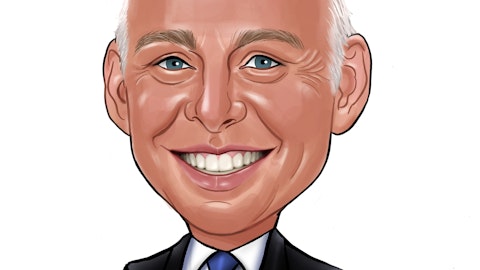But could we also expect more dividends in this situation? And next, regarding the share — what are you going to do with the shares that you hold now? And regarding the credit risk, I know that you have seen some provisioning. So, can you tell us about your plans for the CET1 ratio, taking these factors into consideration? Thank you very much.
Peter Kweon: We will soon answer your question. Please hold.
Scott YH Seo: Thank you for various questions, and I would like to answer those questions. We mentioned our mid capital management and dividend plan and maybe I was not clear enough, so I would like to emphasize this once again. For cash dividends, compared to the past — compared to the previous year, our principle is not to actually have at a level lower than the previous year. So that is our principle. And secondly, for shareholder return that you aforementioned, for a share buyback, as was mentioned in your question, for the KRW300 billion of these shares, well, this will be included in the 2022 TSR, total shareholder return, and there is government-initiated dividend related change for the dividends. And when this is confirmed, then of course, we will include that if the change is confirmed. So, we will communicate with the bank regarding this. And for the Basel III credit risk, well, I would like to ask our group CRO, Cheal Soo Choi, to answer that question.
Cheal Soo Choi: Yes, regarding Basel III, I would like to answer your question for the credit risk. I’m the CRO. And we have actually implemented that already. And for this year, for Basel III, there’s market risk and operational risk that we will implement. And for market risks on sensitivity and for operational alerts, there are some multiples — internal multiples that we will use. And for the numbers, well, we will need to divide that in March. But I think, although I cannot mention the numbers as of now for PI ratio or CET1 ratio, we believe that it will have a positive impact. And we believe that the results will probably be similar to what we have been expecting.
Kim Do-ha: Thank you for the answer.
Operator: We do not have any more questions waiting in the queue, but give us one moment. Yes, we have one question from CLSA. Please go ahead with your question.
Shim Jongmin: Can you hear me okay? My name is Shim Jongmin from CLSA. Thank you for taking my questions. I have one question relating to domestic economic outlook. I would like to understand what the executives take is on the future outlook of the domestic market. We hear these days a lot about the real estate market, and SOHO loans in the past have grown quite steeply. And so, there’s a concern relating to the real estate-related or mortgage-related loans. But is it okay for us to interpret that you are well prepared against such domestic economic recessions? Are there any areas where you are overly concerned about in terms of the domestic market?
Unidentified Company Representative: Allow me to respond to that question. With the very high rate cycle, we are clearly aware of heightened uncertainty. So, we do have concerns. We are mindful of the asset quality, of course. As our CFO has mentioned, we’ve been very conservative. And based on our forward-looking criteria, we have provisioned significantly. Even aside from Bukopin, we’ve applied a lot of stress on our economic scenario based on which we’ve provisioned for the reserve. And also, our asset quality management through our portfolio has always been the range that we have we have been foreseeing. And so, once again, with ample amount of provisions, we will do our best to focus on asset quality management. On some of the areas where there may be more concern compared to the past, as long as we put in corporate-wide effort, we believe that we will be able to keep that under control.




